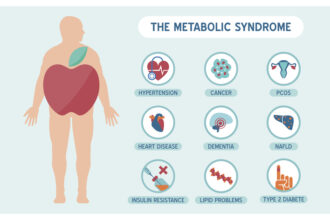According to recent findings published in the Journal of Clinical Endocrinology & Metabolism by the Endocrine Society, regular consumption of moderate amounts of coffee and caffeine may confer a protective effect against the onset of various cardiometabolic diseases, such as type 2 diabetes, coronary heart disease, and stroke.
The research indicates that consistent intake of coffee or caffeine, particularly at moderate levels, correlates with a decreased risk of developing cardiometabolic multimorbidity (CM), defined as the simultaneous presence of two or more cardiometabolic conditions.
As global populations age, the incidence of multiple concurrent cardiometabolic diseases is emerging as a significant public health issue, the study points out.
The findings suggest that coffee and caffeine consumption appear crucial in nearly every stage of CM development.
Dr. Chaofu Ke, M.D., Ph.D., lead author of the study and a faculty member in the Department of Epidemiology and Biostatistics at the School of Public Health, Suzhou Medical College of Soochow University, in Suzhou, China, suggests, “Consuming three cups of coffee daily, or 200-300 mg of caffeine, may assist in lowering the risk of developing cardiometabolic multimorbidity in individuals who do not currently have any cardiometabolic disease.”
The study compares individuals consuming moderate amounts of coffee (three cups per day) or caffeine (200-300 mg per day) with those who consume less than 100 mg of caffeine per day or none at all, finding that moderate consumers had a 48.1% or 40.7% reduced risk, respectively, of new-onset CM.
This research utilised data from the UK Biobank, an extensive and detailed longitudinal dietary study that includes over 500,000 participants aged between 37 and 73 years. The study filtered out participants with unclear data on caffeine intake, leaving a cohort of 172,315 individuals free from any cardiometabolic diseases at the start of the caffeine analysis and 188,091 for the coffee and tea consumption analysis.
The identification of participants’ cardiometabolic disease outcomes was based on self-reported medical conditions, primary care records, linked inpatient hospital data, and death registry records connected to the UK Biobank.
The inverse association between coffee and caffeine intake at all levels and the risk of new-onset CM in participants without pre-existing cardiometabolic diseases was consistent throughout the study. Those who reported moderate intake levels experienced the lowest risk. This moderate intake was inversely linked to almost all stages of CM development.
Dr. Ke concludes, “Our findings underscore the potential benefits of promoting moderate coffee or caffeine consumption as a dietary habit among healthy individuals for the prevention of cardiometabolic diseases.”
More information: Xujia Lu et al, Habitual Coffee, Tea, and Caffeine Consumption, Circulating Metabolites, and the Risk of Cardiometabolic Multimorbidity, The Journal of Clinical Endocrinology & Metabolism. DOI: 10.1210/clinem/dgae552
Journal information: The Journal of Clinical Endocrinology & Metabolism Provided by The Endocrine Society








